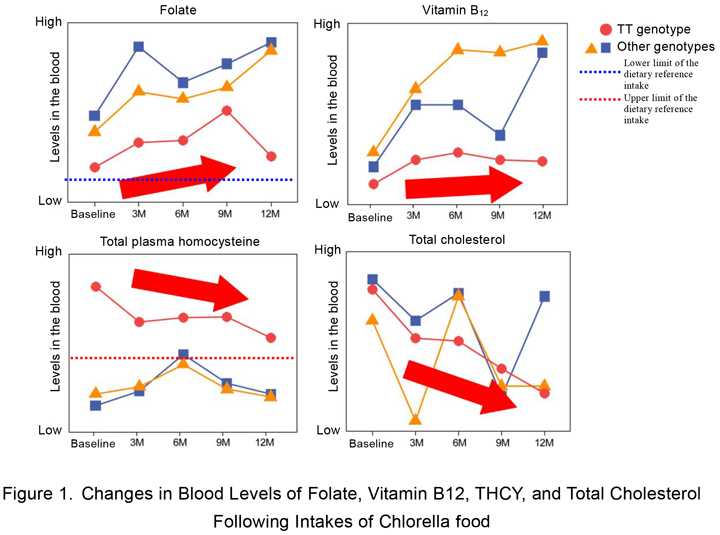- TOP
- List of reports
- Potentials of Chlorella as Vegetable Food
Potentials of Chlorella as Vegetable Food
【Scientific information】
Research and Development Department, Sun Chlorella Corporation
Potentials of Chlorella as Vegetable Food
Presentation in the 18th Meeting of the Japanese Society for Vegetarian Research
This topic was recognized as an excellent presentation by reviewers in the review board,
and the presenter was awarded the Presentation Prize.
- Research Objectives
- It has been known that the intake of Chlorella as vegetable food increases folate and vitamin B12 levels in the blood and contributes to a reduction of high total homocysteine and cholesterol levels. However, the bioavailability of nutrition obtained from diet changes depending on gene polymorphism and life stages. Therefore, we conducted gene expression analyses, focusing on One-Carbon Metabolism (OCM) involving folate and vitamin B12 to explore potentials of Chlorella as food.
- Research Methodology
- Three male subjects (in their 30’s, 40’s, and 50’s) received 8 g/day of Chlorella food for one year. MTHFR C677T polymorphism that is related to bioavailability of folate was determined and the diet survey was conducted prior to the start of research. General blood tests and gene expression analyses were conducted at baseline and every three months thereafter.
- Results
- The determination of MTHFR C677T polymorphism confirmed each one subject with TT
genotype that shows poor folate bioavailability, CT genotype that shows slightly poor folate
bioavailability, and CC genotype that shows usual folate bioavailability. Although the diet
survey showed that the estimated intakes of folate and vitamin B12 exceeded the dietary
reference intake in all three subjects, the subject with TT genotype at baseline had blood
folate level close to the lower limit and total plasma homocysteine (THCY) level markedly
higher than the upper limit. However, blood folate and vitamin B12 levels increased
following 3-month intakes of Chlorella food. Subsequently, not only the folate and vitamin
B12 levels were maintained, but also THCY and total cholesterol levels significantly
decreased in one year (Figure 1). Furthermore, gene expression analyses confirmed the
increased expression of cystathionine beta-synthase (CBS) that converts folate reduction
transporter SLC19A1 and homocysteine to cystathionine, regardless of MTHFR C677T
gene polymorphism (Figure 2).
The above results suggest that the intake of Chlorella food not only increases blood folate level and significantly decreases THCY and total cholesterol levels, but also contributes to an increase in OCM. Although this is preliminary research, Chlorella food is considered useful for supplementing nutrients regardless of gene polymorphism and varied life cycles.


Details
- Academic society:
- The 18th Meeting of the Japanese Society for Vegetarian Research
- Title:
- Potentials of Chlorella as Vegetable Food
- Authors:
- Masaki Fujishima
- Affiliation:
- SUN CHLORELLA CORP.





